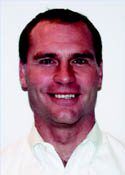 James Merklinger, managing attorney and director of legal resources for the American Corporate Counsel Association (ACCA), attributes his successful lobbying to have language about Tourette syndrome (TS) included in the Children’s Health Act of 2000, to a collegial game of softball.
James Merklinger, managing attorney and director of legal resources for the American Corporate Counsel Association (ACCA), attributes his successful lobbying to have language about Tourette syndrome (TS) included in the Children’s Health Act of 2000, to a collegial game of softball.
Still athletic, Merklinger occasionally takes in a game with the Senate’s only physician, Sen. Bill Frist (R-Tenn.).
Sen. Frist and Sen. Ted Kennedy (D-Mass.) were co-sponsors of the legislation, but the Tourette Syndrome Association of America had been unable to convince the Senate subcommittee working on the bill to include language about TS.
Enter Merklinger, who is active with the Washington chapter of the Tourette Syndrome Association. His friends in the association approached him: “Merk, these people know you. You have to talk to them,” Merklinger recalled. So during a game of softball, he made his pitch to a member of Sen. Frist’s staff.
Although it seemed especially appropriate for inclusion into the Children’s Health Act— which authorizes expanded research and services for a variety of childhood diseases or conditions, including asthma, autism, cerebral palsy, diabetes, early hearing loss, maternal health and infant mortality, and traumatic brain injuries—unfamiliarity with the condition caused TS to be in danger of being overlooked.
Merklinger took great satisfaction when language for TS was included in eleventh hour revisions.
Hope E. Ferguson is a freelance writer who works in public relations for Empire State College, State University of New York.
From the November 2002 issue of Diversity & The Bar®
